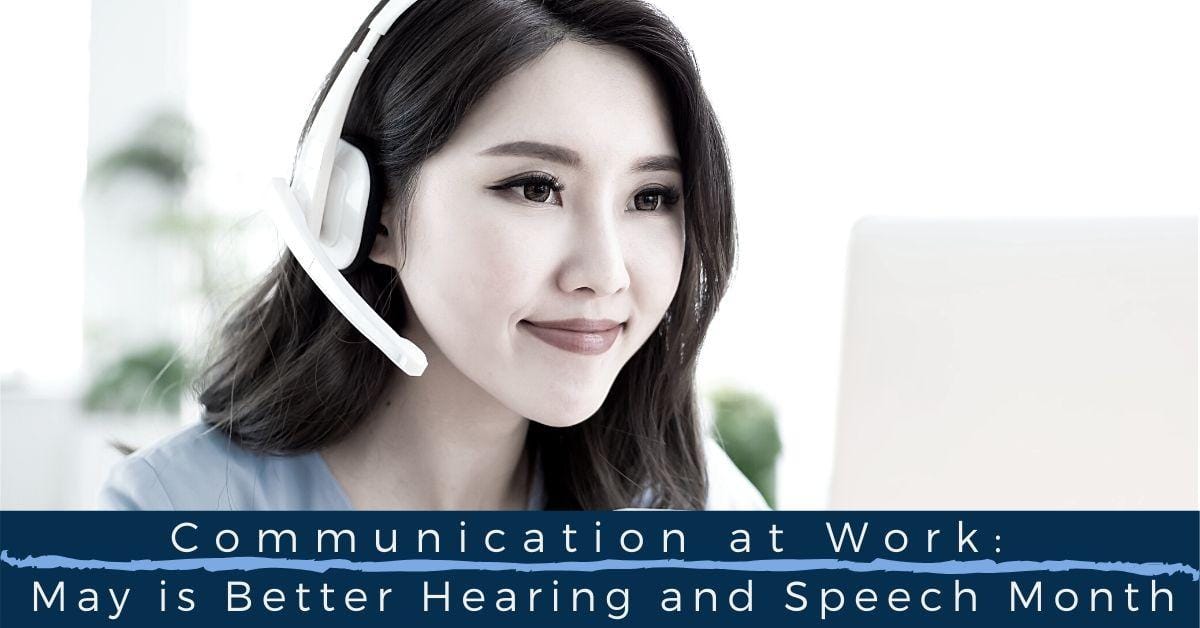
- Exploring the Genetic Landscape of Hearing Loss: Understanding the Role of Genetics - April 15, 2024
- The Hazards of Pretending to Hear - March 25, 2024
- Navigating the World of Cochlear Implants: A Comprehensive Guide - March 15, 2024
Communication is what makes us human. We use it to speak to our loved ones, meet for drinks with our families, and socialize with our colleagues. But if you’re one of the almost 40 million hearing loss-stricken Americans, these avenues of communication could all be cut off.
That’s why ASHA has designated the month of May as Better Speech and Hearing Month, a time to reflect on your hearing health and make meaningful changes. Recognizing hearing loss and opting into treatment increases communication and strengthens the relationships with everyone around you.
This year’s theme is ‘Communication at Work,’ It’s an ideal time to discuss the consequences of hearing loss at work and what we can do about it.
Hearing loss and work
Hearing is so essential to successful workplace communication. Most employment circumstances require you to be able to listen and respond appropriately to work effectively in teams, to communicate with the public, and to ensure safety on the job.
Without proper hearing health, you can be expected to make less annually and can make mistakes at work. You are also more likely to experience some of the following effects:
- Anxiety
- Depression
- Social isolation
- Impeded cognitive functioning
All of these issues can adversely affect your health.
Hearing loss and interviews
It may be unsurprising to learn that those with hearing loss are more likely to experience unemployment than their hearing peers. They also experience more significant difficulties in switching careers relative to those with normal hearing.
One way that those with hearing loss can be at a disadvantage is while looking for a job. Job interviews are exhausting enough without having to contend with the thought of unintentionally disclosing our hearing loss.
Tips for successful interviews with hearing loss
Here are some helpful tips to help you ace your job interview with a hearing loss.
- Ask for a seat, so the person you are talking to is not sitting in front of a window, this helps with lip reading.
- If the room is particularly noisy from an air conditioner or other machine, ask to be switched to a quieter place.
- Ask to interview in a smaller room to reduce echo and reverb.
Frequently asked questions about hearing loss and interviews.
As a work applicant with hearing loss, knowing your rights is vital for advocating for yourself. Here are a few of the commonly asked questions about hearing loss and interviews.
Will I need to tell prospective employers that I have a hearing loss? No, you are not required by law to report your hearing loss or any other medical condition to an employer. Employers can not legally inquire whether you have hearing loss, use a hearing aid, or even ask about your medical condition or background.
When will I report a hearing loss to a prospective employer? If you don’t have unique needs, then you might not ever have to. If you have a slight hearing loss, you might feel that discussing it is unnecessary. If you have moderate to a severe loss of hearing that may need accommodation, consider telling the interviewer before the meeting.
What would I do if I need unique accommodation for loss of hearing? You will need to tell your employer about your hearing loss if you need special equipment for your interview. Employers are legally required to make reasonable accommodation during both the hiring process and after a job offer is made.
Could an employer refuse to hire me for my hearing loss? An employer can not refuse to hire someone with a hearing impairment as long as the candidate can safely perform the required work. However, some professions require an exceptional hearing. Examples include staff in military and emergency services, bus drivers, and air traffic controllers. These may not be ideal jobs for people with hearing impairments because of safety issues.
If you have hearing loss, one of the best ways to prepare yourself for success is to use a hearing aid. We have years of experience fitting hearing aids and are ready to help you make the best decision. Contact us today to set up a hearing test.
